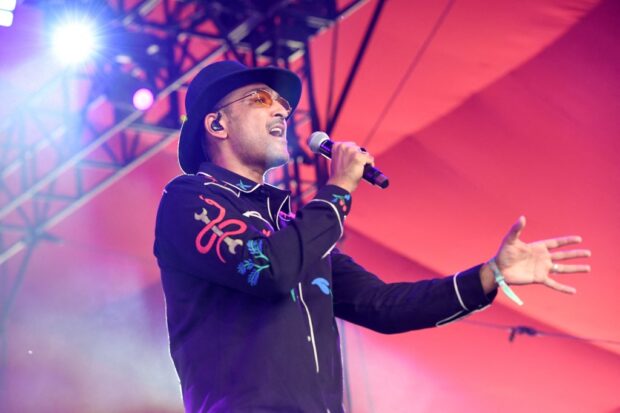Pakistani singer Ali Sethi performs during the first weekend of the Coachella Valley Music and Arts Festival in Indio, California, on April 16, 2023. VALERIE MACON / AFP
INDIO, United States—A tale of forbidden love with an infectious hook, Ali Sethi’s song “Pasoori” has become an international phenomenon, fusing poetic tradition with global beats to fuel the rise of the Pakistani singer’s star.
The Punjabi track whose title roughly translates to “difficult mess” was 2022’s most-searched song on Google and has surpassed half a billion views on YouTube, offering a melodic metaphor for conflict between India and Pakistan in the form of an impassioned love song with an eminently danceable flow.
The song’s origins stem from when Sethi was asked to pen a song for the popular Pakistani television program Coke Studio, which occurred just after an experience where an Indian broadcaster had pulled out of a creative partnership because the 38-year-old is Pakistani.
“You’re a Pakistani, and India and Pakistan are at war, and now we can’t really put up a billboard saying we’re working with you because extremists will set fire to our building,” the singer recalls being told.
“As a Pakistani I’ve grown up with that… ‘Oh you can’t do this because it’s prohibited, yada yada.’”
The experience got his creative wheels turning: “Of course the theme of prohibition is such an eternal theme in South Asian love songs—all true love is prohibited,” he told AFP following an electrifying party of a performance at the Coachella music festival in the United States, a cherry on top of his remarkable year.
“So I wanted to write a song that was sort of a flower bomb hurled at nationalism and hetero-patriarchy,” Sethi continued, wearing a wide-brimmed hat and black button-up with colorful embroidery alluding to styles of the American southwest. “With all the fun innuendos and all this camp energy.”
He says he drew on Punjabi folk songs of his youth, imbuing the lyrics with puns and double entendres, “a nice way to slip in and subvert orthodox views without really appearing to be out beyond the veil.”
He performs the track with Shae Gill, a singer born to a Christian family in Lahore.
Sethi was “astounded” by the global response to the song, which has the improvisational framework of a traditional South Asian “raga” mixed with the region’s contemporary sounds, along with Turkish strings, flamenco-style claps and the four-four Latino reggaeton beats keeping rhythm for much of today’s reigning pop.
“I thought it was going to be this like, indie, niche thing that a bunch of my nerdy fans were gonna like,” Sethi laughed. “I’m just astounded by how many people around the world—particularly in India—loved it and embraced it.”
‘The latest wild idea’
The son of journalist Najam Sethi and politician Jugnu Mohsin, Ali Sethi is also a published author, who began his formal Hindustani classical musical training after graduating from university. He studied Qawwali, a form of Sufi devotionals, and ghazal, a style of lyricism traceable to ancient Arabic poetry.
Today he lives in New York, and is enjoying the “fertile frontier” of experimenting outside the confines of his education, and collaborating with musicians spanning genres including jazz, reggaeton, hip hop and salsa.
“Bringing my stuff to dialogue with it feels very exciting,” Sethi said, adding that it’s helped him embrace a multiculturalism that societal strictures had denied.
“Multilingual, multi-ethnic, multi-valent identities were celebrated in the Sufi shrines 800 years ago—in Lahore, which was where I was born,” he continued. “And yet growing up I was never really encouraged to think of it that way.”
For his Coachella set on Sunday—he’ll perform again at the major festival next weekend—he brought onstage Raja Kumari, an American rapper and singer born in California to Indian parents.
“What we can’t do over there we can do over here,” he said as he grasped Kumari’s hand onstage following their electrifying “Pasoori” duet. “There’s all kinds of forbidden love represented here today.”
“If you forbid it we will do it!” he said to resounding applause.
Sethi has toured recently across the United States and Canada, in cities where he can reach fans in the Indian diaspora.
Yet he can’t perform in India itself, where, according to streaming metrics, he has an enormous fan base.
But for all the surface-level novelty of singing ragas in the California desert, Sethi noted that the form has been thriving there for decades.
The Indian Hindustani classical musician, Ali Akbar Khan, was instrumental in popularizing the genre in the United States, establishing a music school and also teaching at the University of California, Santa Cruz.
“There’s like this ancestry… but it’s also so American on some level,” he said with a wide smile. “America is the land of wild ideas, and I’m just the latest wild idea.”
“And I love it—it feels fine to be a little eccentric, a little new, a little unexpected, a little extra, a little too traditional,” Sethi said.
“That makes sense to me.” /ra
RELATED STORIES:
Bad Bunny, Blackpink, Frank Ocean headlining historic Coachella
Arooj Aftab, the Grammy-winning Pakistani singer serenading Coachella
Read Next
Subscribe to INQUIRER PLUS to get access to The Philippine Daily Inquirer & other 70+ titles, share up to 5 gadgets, listen to the news, download as early as 4am & share articles on social media. Call 896 6000.
For all the latest Entertainment News Click Here
For the latest news and updates, follow us on Google News.

